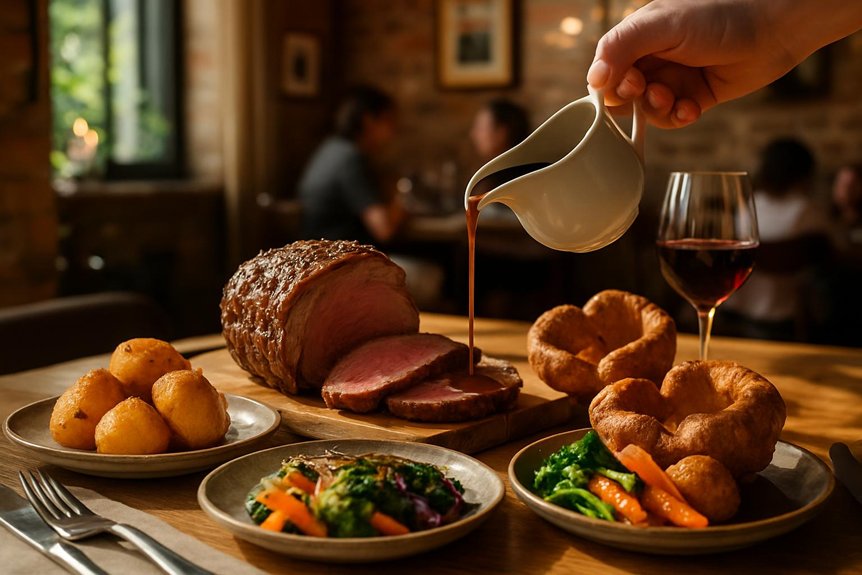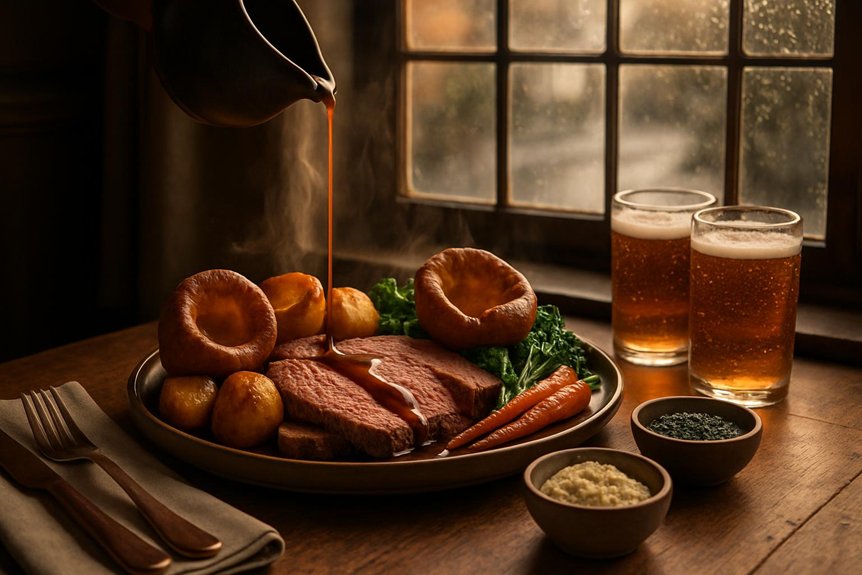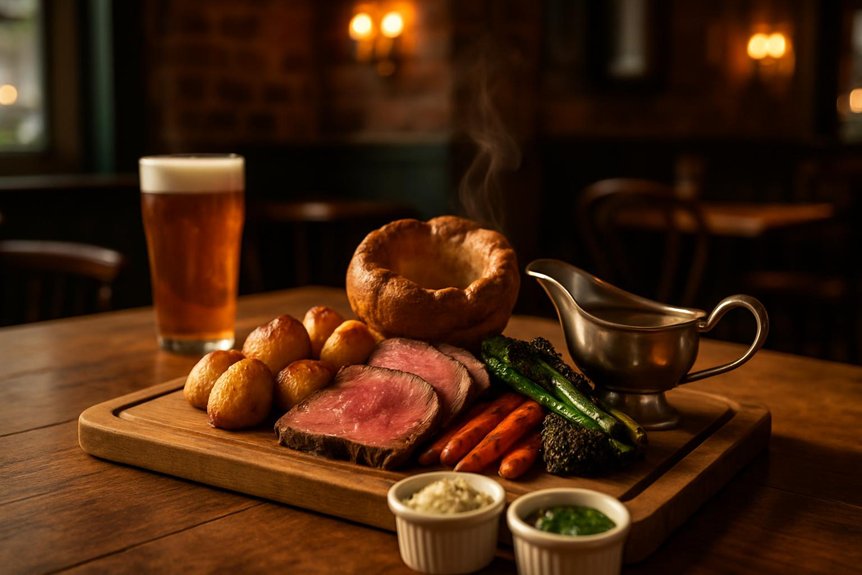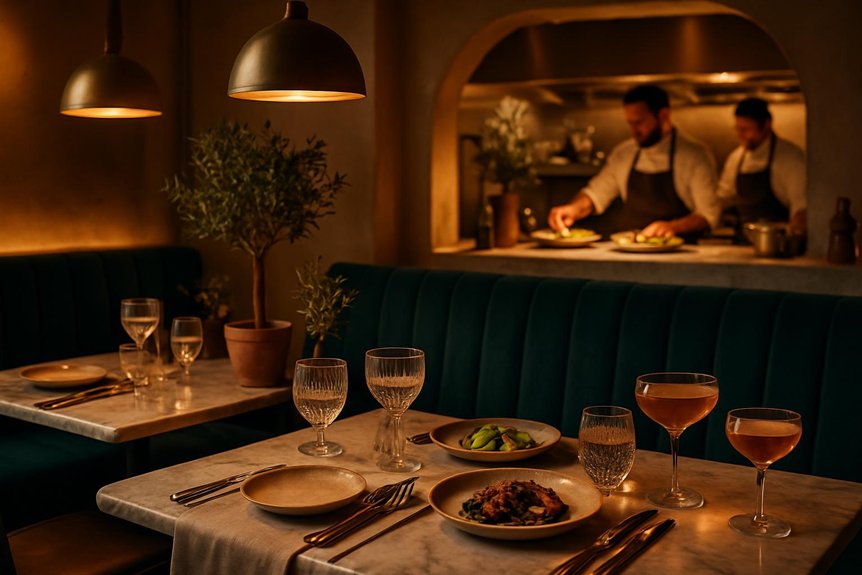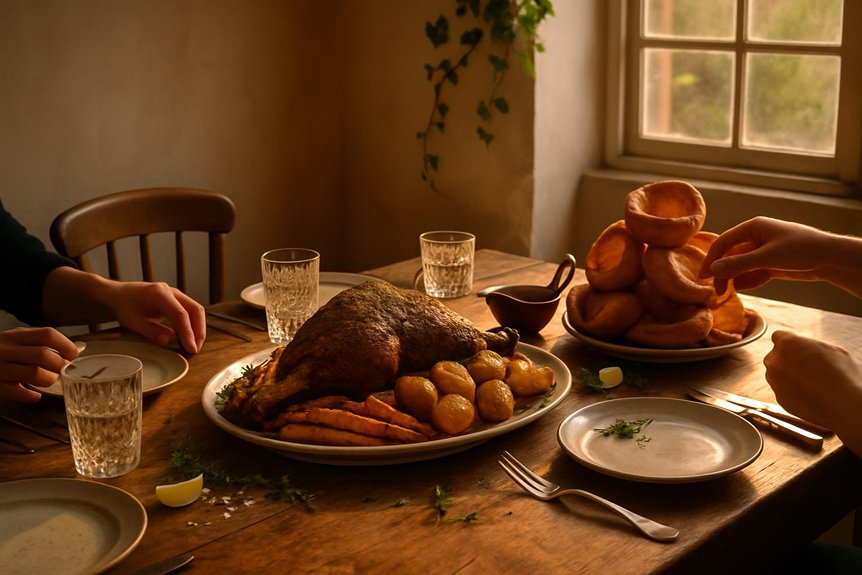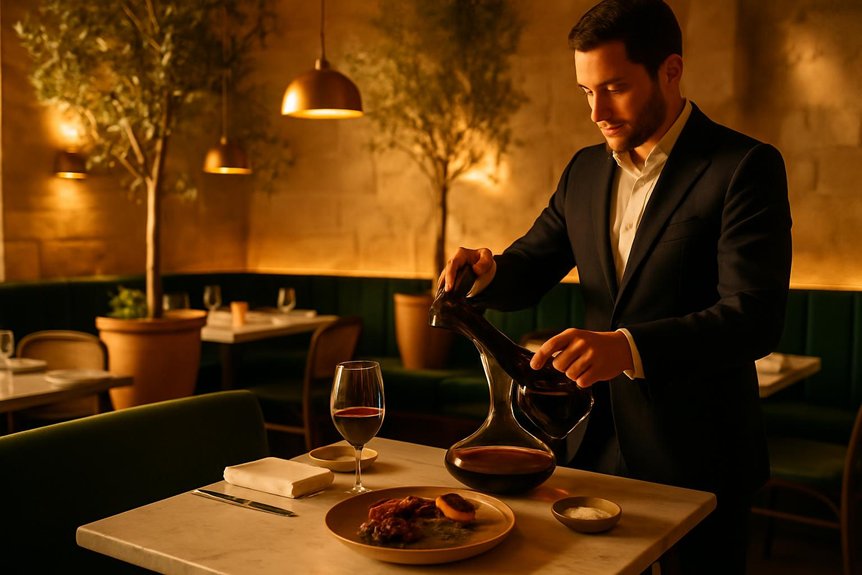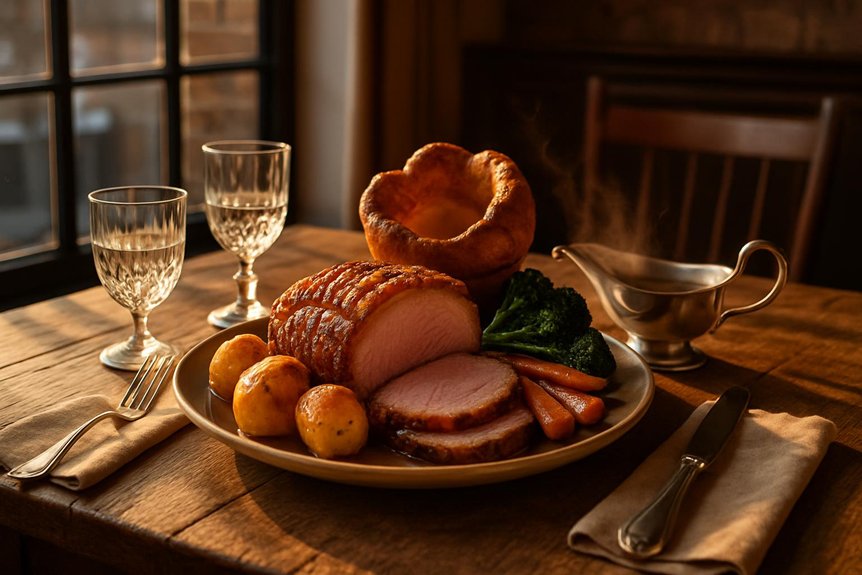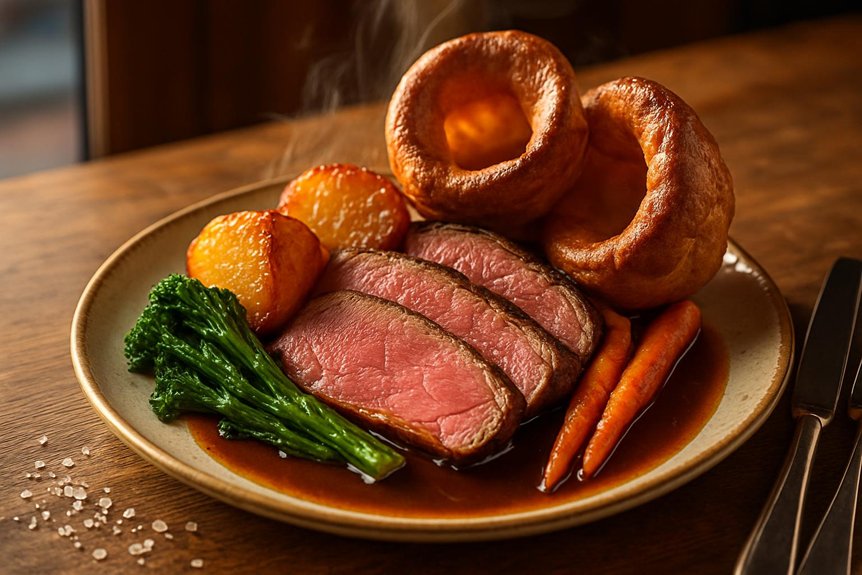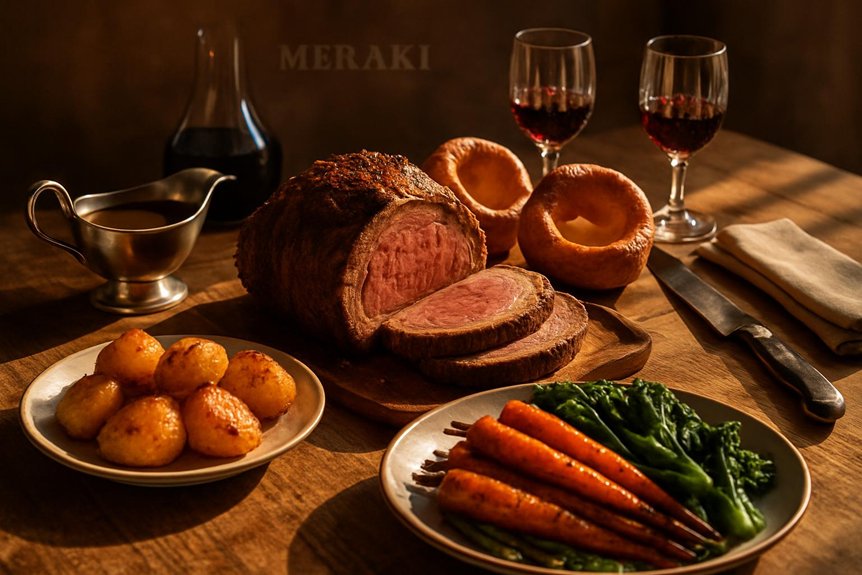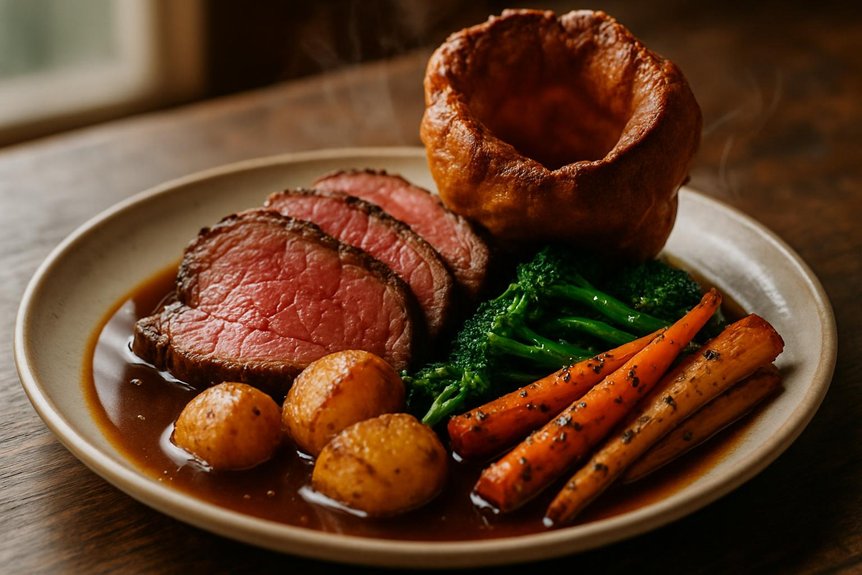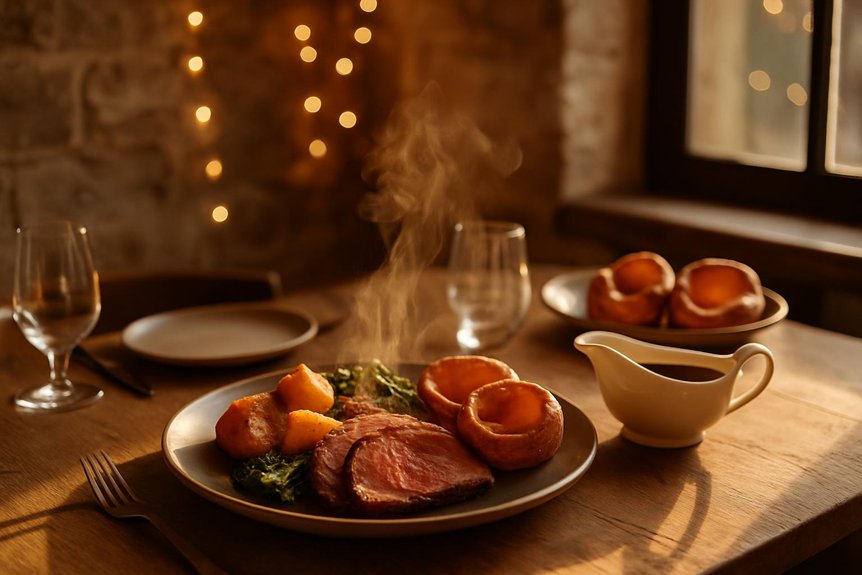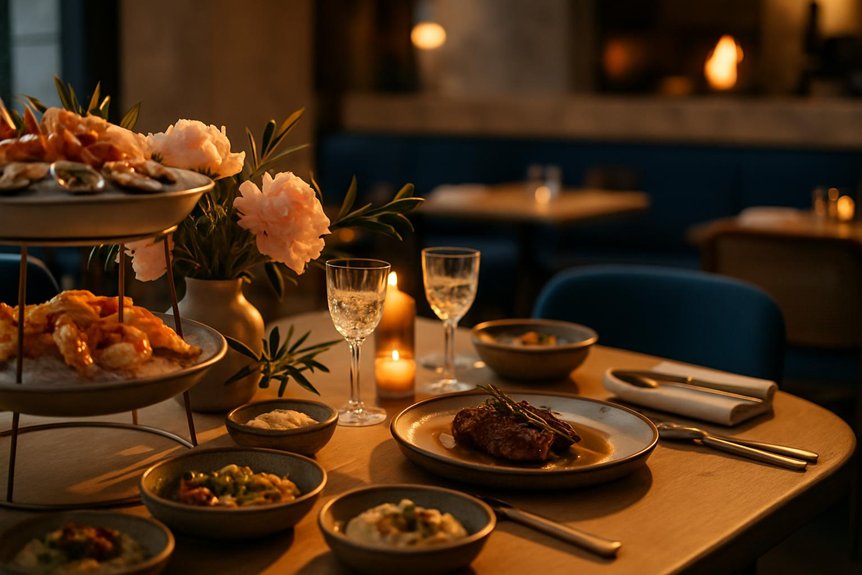A visit to Meraki Restaurant for a traditional Sunday roast presents a composed, well-executed meal rooted in British and Greek influences. Guests encounter carefully sourced meats carved at the table, crispy roast potatoes and seasonal vegetables, with thoughtful gravies and accompaniments. The service is attentive but unobtrusive, and the room feels warm without fuss. For those considering a weekend meal with company, there is more to discover about menu choices and atmosphere.
What to Expect When You Arrive
When guests step through Meraki’s door, they are greeted by warm lighting and the soft murmur of conversation. The host desk is immediately visible, where staff confirm reservations and direct arrivals to seating. The reception process is efficient: names are checked, special requests noted, and coats stored if needed. The dining room layout balances intimacy with communal energy, guiding expectations about noise level and pacing. Menus are presented promptly, with servers offering succinct reservation tips for peak times and suggesting ideal arrival windows. Dress code is relaxed-smart; patrons generally favor neat attire rather than formal wear. Accessibility and dietary accommodations are handled discreetly. Guests can also enjoy exceptional service that enhances the dining experience, thanks to the meticulous attention to detail provided by the attentive staff.
The Roast Meats: Choices and Preparation
Meraki’s roast selection typically includes beef, lamb, pork, and a seasonal poultry option, each chosen for quality and suitability to slow roasting.
Cooking focuses on traditional techniques—controlled roasting times, resting periods, and seasoning—to develop flavor and texture.
Meats are finished and carved to order, with presentation and portioning reflecting the restaurant’s attention to consistency.
For those interested in exploring Greek culinary traditions, Meraki’s extensive wine menu prioritizes Greek wines, offering a perfect complement to the richness of the roast flavors.
Roast Meat Selection
Although rooted in classic British tradition, the roast meat selection at Meraki Restaurant prioritizes provenance and technique.
It offers beef, lamb, pork, and free-range chicken sourced from local farms and prepared to highlight each cut’s character.
The beef offering often features slow-braised beef brisket alongside roasted joint options, trimmed and seasoned to showcase natural beef flavor.
Lamb selections include lean racks and hearty lamb shank, emphasizing earthy, pastoral notes from regional flocks.
Pork is presented as crackling-skinned loin or shoulder with balanced fat and seasoning.
Free-range chicken is roasted whole or as supremely juicy portions.
Each meat is paired with seasonally appropriate accompaniments and sauce suggestions, enabling diners to appreciate distinct textures and flavors without distracting embellishment.
The menu at Meraki also features unique ingredients like goat cheese in tomato salad and ox cheek pasta, adding a quirky twist to the traditional dining offerings.
Cooking & Carving
A focused approach to cooking and carving guarantees each roast meat’s texture and flavor are presented at their best. Chefs at Meraki apply precise meat preparation methods—tempering, seasoning, and controlled resting—to lock in juices and achieve consistent doneness.
Cooking times and temperatures are adjusted to cut and weight, ensuring beef remains tender, lamb retains succulence, and pork develops crisp crackling without drying.
Carving techniques are executed at service: knives are sharp, slices uniform, and joints steadied to preserve presentation and portion control. Staff carve to reveal optimal grain and fat distribution, arranging cuts to maximize taste and mouthfeel.
Attention to these stages transforms selected cuts into the defining element of the traditional Sunday roast experience.
Perfectly Crispy Roast Potatoes
Meraki’s kitchen selects a floury variety for ideal interior fluff and exterior crunch.
Potatoes are parboiled then shaken to roughen the surfaces, creating the texture that crisps best.
A final blast of high heat in a well-heated pan completes the roast to golden perfection.
Potato Variety Choice
Selecting the right potato variety is the single most important step toward perfectly crispy roast potatoes. Floury types such as Maris Piper, King Edward, or Yukon Gold provide an ideal balance of dry, starchy flesh that fragments on parboiling and yields a fluffy interior with a rough surface for maximum crisping.
A chef at Meraki values consistency and pairs choices with other sides—sweet potato and herb infused mash appear elsewhere on the menu, so white varieties must stand distinct. Consider these practical points:
- Maris Piper: classic texture and deep crisp potential.
- King Edward: robust flavour, holds shape while yielding fluff.
- Yukon Gold: slightly waxy, golden colour, good browning.
- Russet (where available): high starch, very crunchy exterior.
Parboil and Roughen
How should the potatoes be prepared after cutting to guarantee maximum crunch? The kitchen parboils evenly sized pieces until edges begin to soften, then drains thoroughly. While still warm, the cook returns them to the pot and agitates to roughen surfaces; this creates coarse facets that crisp in the oven.
A light coating of fat adheres better to roughed exteriors, promoting even browning. Seasoning is applied judiciously before roasting to complement, not mask, inherent starchiness.
These culinary techniques prioritize texture while maintaining clean flavor profiles, allowing aromatic herbs or garlic to enhance without overwhelming. Timing and gentle handling ensure interiors stay fluffy as exteriors turn golden, producing roast potatoes that deliver crisp contrast and satisfying mouthfeel.
High-Heat Roast Timing
When should the potatoes go into the oven to achieve the ideal crispness and tender interior? The chef times the high-heat phase precisely: after parboiling and roughening, potatoes are shaken, drained, and oiled before roasting. A focused approach balances exterior crunch with a fluffy center.
- Preheat oven to a high oven temperature (220–230°C/425–450°F) to initiate rapid browning.
- Place potatoes in a single layer on a hot tray to maximize contact and blistering.
- Roast undisturbed for the first 20–30 minutes, then turn to expose new surfaces for even crisping.
- Remove when deeply golden, then allow a short resting time (5–10 minutes) to settle textures before serving.
Seasonal Vegetables and Sides
Seasonal vegetables and complementary sides at Meraki are chosen to highlight texture, color, and the roast’s savory profile. The menu shifts with market availability: tender spring asparagus, summer heritage carrots, autumn brassicas, and winter root medleys.
Each vegetable is treated simply—roasted, steamed, or glazed—to preserve freshness and natural sweetness. Flavorful sides are balanced to support the meat without overpowering it: crisp herb potatoes, buttery mashed tubers, and braised leeks offer contrasts in mouthfeel.
A light pickled element or seasonal salad adds acidity to cut richness. Portions are scaled for sharing, encouraging communal dining. Presentation emphasizes rustic elegance, with vibrant vegetables arranged alongside sides to complement the roast visually and gastronomically.
The Art of the Gravy and Sauces
While the roast provides the centerpiece, the gravies and sauces at Meraki are its essential collaborators, engineered to amplify meat flavor, bind components, and add layered moisture. Attention to gravy consistency guarantees each pour coats rather than drowns, balancing glossy viscosity with spoonable silk.
Sauces are chosen to complement cut and seasoning, from reduced red-wine jus for beef to pan-drippings enriched with shallot and thyme for lamb. Classic accompaniment choices are presented with clear sauce recommendations for guests seeking contrast or harmony.
Tasting notes guide portioning and pairing at service.
- Red-wine jus — concentrated, medium-thick, bold.
- Pan-drip thyme sauce — savory, glossy, herb-forward.
- Mustard cream — tangy, smooth, light.
- Pork jus with apple — sweet-acid balance.
Vegetarian and Vegan Roast Options
Although rooted in the same ritual as the meat roasts, Meraki’s vegetarian and vegan options are crafted to stand independently, offering equal focus on texture, seasoning, and roast technique.
The kitchen presents meatless alternatives such as roasted cauliflower steaks, nut-crusted wellingtons, and charred root vegetable medleys, each finished with herb-infused oils and crisp edges.
Vegan options include slow-roasted aubergine with smoky paprika, maple-glazed carrots, and chickpea-based stuffing, designed to deliver savory depth without animal products.
Sides are adapted—creamed celeriac, roasted seasonal greens, and vegan Yorkshire puddings—so the plate achieves balance and contrast.
Presentation emphasizes rustic simplicity, letting roasted caramelization, crunchy components, and layered seasoning define the meat-free roast experience.
Drinks Pairings and Dessert Choices
After presenting vegetarian and vegan roasts with attention to texture and seasoning, Meraki’s beverage and dessert selections are designed to complement those same principles—balance, contrast, and caramelized depth.
Guests are offered considered wine pairing options and non-alcoholic alternatives that echo herbaceous, roasted, and umami notes. The dessert selection emphasizes seasonal fruit, browned butter, and restrained sweetness to finish without overwhelming.
- A light-bodied white with citrus and mineral notes to cut richness.
- A low-tannin red highlighting berry and spice for roasted root vegetables.
- A sparkling option to refresh the palate between bites.
- A coffee or herbal infusion choice to ground the meal before a citrus tart or salted caramel mousse dessert.
Each suggestion aims for harmony with the roast’s textures and seasoning.
Atmosphere, Service, and Booking Tips
Because the dining room balances warm wood tones, soft amber lighting, and unobtrusive background music, Meraki cultivates a relaxed yet attentive atmosphere that complements the Sunday roast experience. The dining ambiance is comfortably refined, encouraging conversation without overwhelming noise.
Service is efficient and unobtrusive; servers explain specials, time courses appropriately, and accommodate dietary requests with professionalism. Staff friendliness is consistent, creating a welcoming tone from arrival through dessert.
For bookings, early reservations are recommended—especially for weekend service—with online and phone options available. Specify seating preferences and any allergies when reserving to streamline arrival. Walk-ins are occasionally accommodated but can face waits during peak hours.
Celebrations and Group Dining Options
The same attentive service and warm dining room that suit a relaxed Sunday roast also make Meraki a strong choice for celebrations and group dining. Private corners and adaptable seating accommodate birthdays, anniversaries, and small corporate gatherings, with careful table settings that balance formality and comfort.
Menus offer sharing roasts and set courses; pastry textures are considered for desserts to guarantee variety and crowd appeal. Group coordinators can request tailored options and dietary accommodations, while staff manage pacing and presentation.
Benefits include clear pricing, easy pre-ordering, and attentive timing.
- Flexible seating arrangements
- Bespoke set menus
- Dietary accommodations and pre-ordering
- Coordinated service and timing
Conclusion
At Meraki, the Sunday roast is a warm embrace of Greek and British traditions, where carved meats, crisp potatoes and seasonal veg sing in harmony. Service is attentive, the room cozy, and each plate balanced with rich gravy and thoughtful sides. Whether celebrating or gathering casually, guests leave sated and smiling — like a well-kept secret finally shared — making Meraki’s roast both a comforting ritual and a memorable London dining experience.
